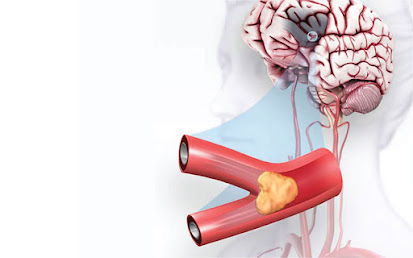Stroke: a serious condition caused by a blockage or rupture of a blood vessel in the brain, which can result in a sudden onset of symptoms such as severe headache, dizziness, and loss of consciousness.
A
brain stroke, also known as a cerebrovascular accident (CVA), occurs when the
blood flow to a part of the brain is interrupted or reduced. This can happen
due to a blockage in an artery that supplies blood to the brain, or because of
bleeding in the brain.
When the blood supply
to the brain is disrupted, brain cells can begin to die within minutes, which
can cause permanent damage to the affected area. The symptoms of a stroke can
vary depending on the location and severity of the brain damage, but they can
include:
- Sudden
weakness or numbness in the face, arm, or leg (usually on one side of the
body)
- Sudden
trouble speaking or understanding speech
- Sudden
confusion or trouble with vision, such as blurred or double vision
- Sudden
severe headache
- Sudden
dizziness or loss of balance or coordination
If you suspect that you
or someone else may be having a stroke, it is important to seek immediate
medical attention. Time is critical in treating a stroke, as the sooner
treatment is started, the better the chances of recovery. Treatment may involve
medication to dissolve blood clots or surgery to remove blockages or repair
damaged blood vessels. Rehabilitation may also be necessary to help individuals
regain lost abilities and relearn skills that may have been affected by the
stroke.
The
treatment of a brain stroke, or cerebrovascular accident (CVA), depends on the
type and cause of the stroke. There are two main types of strokes: ischemic and
hemorrhagic. Ischemic strokes occur when a blood clot blocks an artery that
supplies blood to the brain, while hemorrhagic strokes occur when a blood
vessel in the brain ruptures and causes bleeding.
Unani
medicine is a traditional system of medicine that originated in ancient Greece
and is practiced in various parts of the world, including India, Pakistan, and
the Middle East. Unani medicine uses natural remedies and holistic approaches
to treat various illnesses and conditions, including brain stroke.
In Unani medicine,
brain stroke is referred to as Laqwa, and the treatment approach involves a
combination of dietary modifications, herbal remedies, and lifestyle changes.
The following are some common Unani remedies used for the treatment of brain
stroke:
1.
Diet modification: In Unani medicine, a
healthy diet is considered essential for maintaining overall health and
preventing disease. Patients with brain stroke are advised to follow a diet
that is low in fat, high in fiber, and rich in antioxidants, such as fruits,
vegetables, and whole grains.
2.
Herbal remedies: Unani medicine uses a
variety of herbs and natural remedies to treat brain stroke, including:
- Ginger:
Ginger has anti-inflammatory and anti-oxidative
properties and can help improve blood circulation, which can benefit patients with brain stroke. - Garlic:
Garlic is also known for its anti-inflammatory and anti-oxidative
properties and can help lower blood pressure and cholesterol levels, which
are risk factors for stroke.
- Ginkgo
biloba: Ginkgo biloba is an herbal supplement that has been shown to
improve blood flow to the brain and may have neuroprotective effects.
3.
Lifestyle changes: In addition to dietary
modifications and herbal remedies, Unani medicine also emphasizes lifestyle
changes such as regular exercise, stress management, and good sleep habits.
These lifestyle changes can help reduce the risk of stroke and promote overall
health and well-being.
It is important to note
that while Unani medicine can be beneficial for some patients with brain
stroke, it should not be used as a substitute for conventional medical
treatment. Patients with brain stroke should always consult with their
healthcare provider and follow their recommended treatment plan.
I need to clarify that homeopathic treatment has not been
proven to be effective in treating brain stroke. Brain stroke is a medical
emergency that requires immediate medical attention, and homeopathy should not
be used as a substitute for conventional medical treatment.


No comments:
Post a Comment